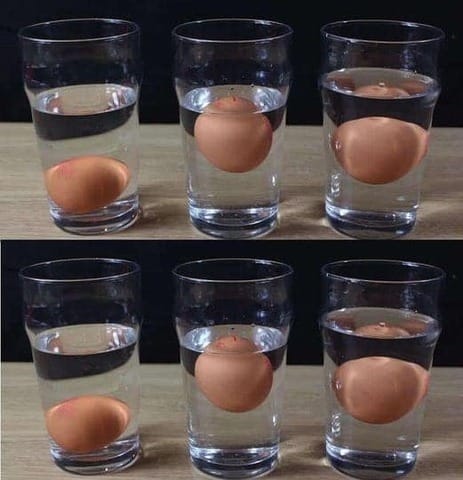
Eggs are one of the most versatile and nutrient-rich staples in any kitchen. But nothing ruins a dish faster—or poses more risk—than using a spoiled egg. Whether you’re baking a cake, making breakfast, or prepping for meal prep, knowing how to check an egg’s freshness can save you time, money, and your stomach.
So how can you confidently tell whether that egg in your fridge is still good?
Here are the three best methods to test if an egg is fresh, safe, or spoiled—and you don’t need any fancy tools to do it.
🧪 1. The Float Test (Most Reliable)
This classic trick has stood the test of time—and for good reason. It’s easy, quick, and incredibly accurate.
How to Do It:
- Fill a glass or bowl with cold water.
- Gently place the egg in the water.
- Observe what happens.
What It Means:
| Result | Egg Condition |
|---|---|
| Sinks and lays flat | Very fresh |
| Sinks and stands upright | Still okay, but a few days old |
| Floats to the top | Spoiled – toss it! |
💡 Why it works:
Eggshells are porous, meaning air slowly seeps inside over time. The more air, the more buoyant the egg becomes. That’s why older (spoiled) eggs float.
👃 2. The Sniff Test (Nature’s Alarm System)
Even if an egg looks fine, the smell test never lies.
How to Do It:
- Crack the egg into a clean bowl or plate.
- Smell it immediately.
What It Means:
- Fresh egg: No noticeable smell or maybe a faint neutral one.
- Bad egg: Strong, sulfuric, or rotten odor — unmistakable and unpleasant.
⚠️ Tip: Always crack eggs into a separate bowl before adding them to other ingredients. That way, you won’t ruin a whole dish with one bad egg.
👂 3. The Shake Test (Quick, but Less Common)
This method isn’t as precise as the float test but can help in a pinch.
How to Do It:
- Hold the egg up to your ear.
- Shake it gently.
What It Means:
- No sound: Likely fresh — the yolk and whites are still firm.
- Sloshing sound: The egg is older; the contents have broken down and liquefied — may be spoiled.
🧼 Extra Safety Tips
- Check the expiration date on the carton—but remember, eggs often last beyond this if stored properly.
- Store eggs in their original carton in the coldest part of your fridge (not the door).
- Wash hands and surfaces after handling raw eggs to avoid cross-contamination.
🥄 Final Thoughts: Trust Your Eyes, Ears, Nose (and a Bowl of Water)
You don’t need to play a guessing game every time you open the fridge. With these simple, time-tested methods, you can tell if your eggs are still fresh—and keep your meals safe and delicious.





Leave a Reply